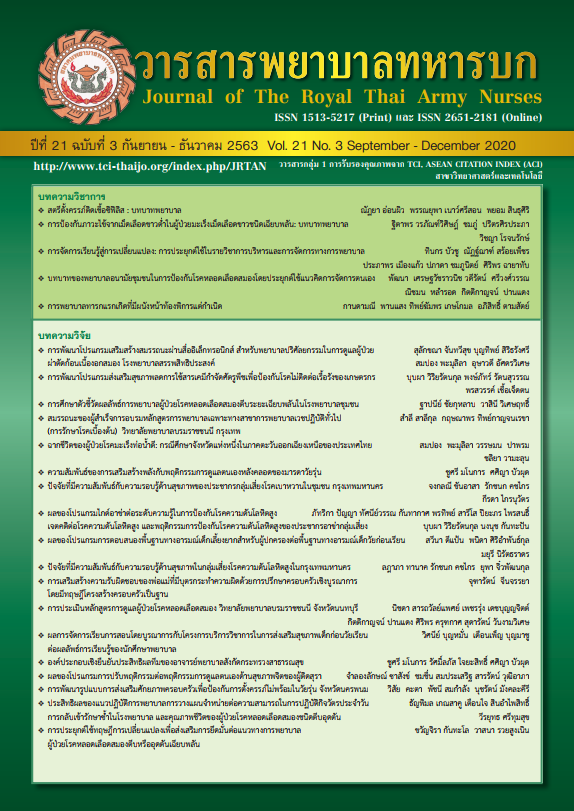A Confirmatory Factor of Team Effectiveness for Nursing Instructors under the Ministry of Public Health
Keywords:
Confirmatory Factor, Team EffectivenessAbstract
The objective of this research was to check the concordance confirmatory of emotional intelligence, individual characteristics, servant leadership, and team effectiveness for nursing instructors under the Ministry of Public Health. A sample of 325 was randomly selected by multi stage sampling from nursing instructors under the Ministry of Public Health. The research instrument was a questionnaire which used to collect data were an opinion of emotional intelligence, individual characteristics, servant leadership, and team effectiveness. The data were collected using confirmatory factor Analysis (CFA). When analyzing the confirmatory factors found that the weight values of the factors were positive value between 0.31-0.53 with statistically significant level = 0.01
The results of the concordance test were found that the chi-squared score = 139.87 at the degree of freedom (df) = 109, the goodness-of-fit index (GFI) = 0.96, the adjusted goodness-of-fit index (AGFI) = 0.93, confirmatory fit index (CFI) = 1.00, the Standardized Root Mean Square Residual (SRMR) = 0.03, and the root mean square error of approximation (RMSEA) = 0.03 which shows that the model of emotional intelligence, individual characteristics, servant leadership, and team effectiveness for nursing instructors under the Ministry of Public Health comply with the empirical data in good condition.
Downloads
References
Townsend R.M. Risk and Insurance in Village India. Econometrica 1994; 62 (3): 539-591.
Ucharattana P. Nursing Management. Bangkok: Boonsiri Printing; 1998. (in Thai)
Komutikanon S. A Study Actual States and Expectation of Team Working as Reported by Health Team in the Hospitals under the Jurisdiction of Department of Medical Services, Bangkok Metropolitan Administration [Thesis]. Bangkok: Chulalongkorn University; 1993. (in Thai)
Black G.L. A Correlational Analysis of Servant Leadership and School Climate [Thesis]. University of Phoenix; 2007.
Irving J.A. Servant Leadership and the Effectiveness of Teams [Thesis]. Regent University; 2005.
Rajamangala University of Technology Phra Nakhon. Guidelines for Developing Competency Systems for Human Resource Management; 2014. (in Thai)
Mayer J.D.; and Salovey P. What is Emotional Intelligence?. New York: Basic Book; 1997.
Cooper R.K.; and Sawaf A. Executive EQ: Emotional Intelligence in Leadership and Organization. New York: Grosset Putnam; 1997.
Hu J.; and Liden R.C. Antecedents of Team Potency and Team Effectiveness: An Examination of Goal and Process Clarity and Servant Leadership. Journal of Applied Psychology 2011; 96 (4): 851-862.
Goleman D. Emotional Intelligence: Perspectives on a Theory of Performance. In: Cherniss C, Daniel Goleman, editors. The Emotionally Intelligent Work place. San Francisco: JosseyBass; 2001.
Dierendonck D.V. Servant Leadership: A Review and Synthesis. Journal of Management 2011; 37 (4): 1228-1261.
Patterson K.A. Servant Leadership: A Theoretical Model. Dissertation Abstracts International 2003; 64 (2): 570.
LaFasto F.; and Larson C. When Team Work Best: 6,000 Teams Members and Leaders Tell What It Takes to Succeed. Thousand Oaks, CA: Sage; 2002.
Yamane T. Statistic: An Introductory Analysis. 3rd ed. New York: Harper & Row; 1973.
Dannhauser Z.; and Boshoff A.B. Structural Equivalence of the Barbuto and Wheeler (2006): Servant Leadership Questionnaire on North American and South African Samples. International Journal of Leadership Studies 2007; 2 (2): 148-168.
Mahembe B.; and Engelbrecht A.S. The Relationship between Servant Leadership, Organizational Citizenship Behavior and Team Effectiveness. SA Journal of Industrial Psychology 2014; 40 (1): 10 pages.
Covey S.R. Servant Leadership. Leadership Excellence 2006; 23 (12): 5-6.
Abel A.T. The Characteristics, Behaviors, and Effective Work Environments of Servant Leaders: A Delphi Study [Thesis]. Virginia: Blacksburg; 2000.
Lambert W.E. Servant Leadership Qualities of Principals Organizational Climates, and Student Achievement: A Correlational Study [Thesis]. Southeastern: Graduate School Nova Southeastern University; 2004.
Chaiyapheuk B. A Study of Servant Leadership Characteristics and School Climate of Infant Jesus Sister Schools [Thesis]. Bangkok: Srinakharinwirot University; 2007. (in Thai)
Drury S. Employee Perceptions of Servant Leadership: Comparisons by Level and with Job Satisfaction and Organizational Commitment [Thesis]. Regent University; 2004.
Anantasainon S. Influence of Characteristic, Individual and Group Emotional Intelligence Affecting the Team Effectiveness [Thesis]. Bangkok: Ramkhamhaeng University; 2001. (in Thai).
Stubbs E.C. Emotional Intelligence Competencies in the Team and Leader: A Multi-level Examination of the Impact of Emotional Intelligence on Group Performance. Dissertation for the Degree of Doctor of Philosophy. Case Western Reserve University. 2005.
Tanpuan N. Motional Quotient of School Administrators affecting School Effectiveness Administration under the Office of Sakon Nakhon Educational Service Area 3 [Thesis]. Sakon Nakhon: Sakon Nakhon Rajabhat University 2008; 5 (18): 29-44. (in Thai)
Goleman D. Working with emotional intelligence. New York: Bantam Books; 1998.
McClelland D.C. Testing for Competence Rather than for Intelligence. American Psychologist 1973; 28: 1-14.
Chongjarearn A. Ponathong C.; and Yongson C. The Confirmatory Factor Analysis of Nursing Students’ Caring Characteristics. Journal of the Royal Thai Army Nurses 2018; 19 (Supplement): 354-363. (in Thai)
Austin A.E.; and Baldwin R.G. Faculty Collaboration: Enhancing the Quality of Scholarship and Teaching. Washington D.C.: The George Washington D.C. School of Education and Human Development; 1991.
Downloads
Published
How to Cite
Issue
Section
License
บทความหรือข้อคิดเห็นใดใดที่ปรากฏในวารสารพยาบาลทหารบกเป็นวรรณกรรมของผู้เขียน ซึ่งบรรณาธิการหรือสมาคมพยาบาลทหารบก ไม่จำเป็นต้องเห็นด้วย
บทความที่ได้รับการตีพิมพ์เป็นลิขสิทธิ์ของวารสารพยาบาลทหารบก
The ideas and opinions expressed in the Journal of The Royal Thai Army Nurses are those of the authors and not necessarily those
of the editor or Royal Thai Army Nurses Association.






